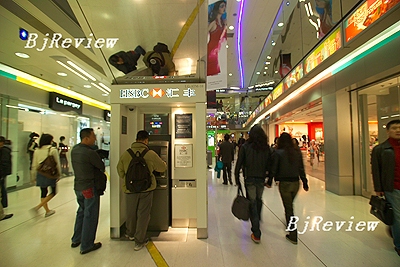
Fan Huiliang, a Fujian tea merchant who operates a shopping center for tea products, recently received a delicately designed invitation from a foreign bank inviting him to attend a financial lecture. Two days before, he had come across an advertisement for the event at an international service apartment. After sending off an e-mail(2¥Œ) confirmation, he quickly received his invitation.
Fan became acquainted with Chen, a man seated next to him at the lecture which was held at a four-star hotel. While talking, he found out that Chen had received the invitation while purchasing a house at a developer's sales office. More than 200 people attended the lecture that day with similar stories about how they got there.
The lecture consisted of two parts: an overview of the stock price trends in different countries, an analysis of the state of the U.S. economy, and later a presentation focusing on new products. During the break, Fan discovered that each guest had been appointed an individual financial advisor. After the lecture, many guests were able to discuss with their advisors over coffee. Meanwhile, many guests formulated preliminary investment intentions and made appointments with the foreign bank for more detailed information on their wealth management products.
The first four locally incorporated foreign banks--Citibank (China), HSBC (China), Standard Chartered (China) and Bank of East Asia (China)--formally opened for business on April 1, and can now engage in direct competition with Chinese banks from the same starting line, providing residents of the Chinese mainland with a full range of banking services, including renminbi savings and loans, fund trading and wealth management products.
Many foreign banks have changed their strategy from "waiting for customers" to "seeking out customers." The Ideal International Plaza in Zhongguancun, Beijing's "Silicon Valley," houses many renowned IT enterprises such as Sina and Aigo. Citibank has also set up a branch on the ground floor of the plaza, targeting these new IT elite enterprises, launching a face-to-face competition for customers with Bank of China (BOC), which has a branch located in the same building.
Meanwhile, Chinese banks are also busy preparing for the challenge. Besides expanding their business and recruiting more employees, renovating banking outlets and enlarging VIP service centers, the decision announced on April 20 to end cross-bank inquiry fees is another positive sign. Foreign banks have a competitive edge in terms of innovative and internationalized practices, while Chinese banks boast advantages through the scale of their networks. Who will come out on top is the major question.
Competitive foreign banking products
In order to better promote the localization of their frontline operations, the four locally incorporated foreign banks have all created plans to double the number of their operation outlets this year.
According to the latest statistics, 74 foreign banks from 22 countries and regions have established 200 branches and 79 sub-branches in 25 Chinese cities. Among them, HSBC owns the largest number of outlets, having 14 branches and 21 sub-branches on the Chinese mainland.
Foreign banks, which target the middle to high-income population, have successively introduced structural savings services and many other investment products such as Qualified Domestic Institutional Investors (QDIIs). Some products could achieve annual return rates of more than 20 percent within half a year. These products are extremely tempting both in terms of their investment portfolio and actual profitability.
Diversification of wealth management products is another distinction of foreign banks. For example, the Bank of East Asia has set very detailed terms for foreign currency fixed deposits, allowing customers to choose different wealth management products with terms ranging from three months to five years.
| 